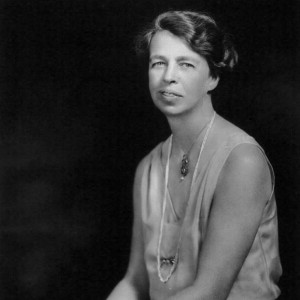Eleanor Roosevelt is enjoying a renaissance of attention and affection that may propel her onto the $20 bill. There are other practical uses for Mrs. Roosevelt’s deep legacy, and we will see some of them at work in the 2016 presidential campaign.
On the wings of the acclaimed 2014 Ken Burns documentary “The Roosevelts”, Mrs. Roosevelt is emerging as the favorite in a growing movement to remove Andrew Jackson from the $20 bill and replace him with a woman. Balloting and polling suggests that the remarkable niece of Theodore Roosevelt and wife of Franklin D. Roosevelt is the top choice of people with an opinion.
U.S. Senator Jean Shaheen (D-NH) introduced legislation to create a process that would replace Jackson, whose legacy is as a cruel advocate for the removal of Indian tribes–often by force–from their ancestral lands to the inhospitable west along the Trail of Tears. The sooner we see the back of him, the better.
Mrs. Roosevelt, a Democrat, was the original modern First Lady and also the longest serving, from 1933-1945. She had created and enjoyed an independent life in politics and public service long before her husband was elected president in the depths of the Great Depression.
Hillary Clinton has spent decades soldering herself to Mrs. Roosevelt’s long legacy of sacrifice and activism. In 2012, former President Bill Clinton confirmed that his wife “was known to commune with Eleanor on a regular basis.” The conversations had to have been one way, and the first time Mrs. Roosevelt failed to enlighten an admirer.
We’re in for a lot of references to Mrs. Roosevelt in the fourth Clinton presidential campaign. The weaving of Clinton campaign myths may soon make the truth impenetrable. Hillary Clinton shares few of Eleanor Roosevelt’s many virtues.
Mrs. Roosevelt was a warm and generous personality. She craved an anonymity that allowed her unfettered contact with the world. Mrs. Roosevelt liked the press. She was a popular newspaper columnist and broke all precedents by holding frequent press conferences. None of that describes Hillary Clinton.
Born into privilege, Mrs. Roosevelt preferred modest, often austere, living arrangements. Most of the time when she was at the Roosevelt spread in Hyde Park, New York, Mrs. Roosevelt lived in a small stone house away from the familiar ancestral home of her husband. Hillary Clinton, famously described as a Methodist who thinks she should live like an Episcopal bishop, has developed an unseemly taste for luxury.
The Clinton way of splendor and entitlement is what FDR was referring to when in 1936 he condemned “economic royalists” carving “new dynasties.” Today he would have included a former secretary of state who charges $300,000 an hour to give a speech. Mrs. Roosevelt would have been appalled.
Mrs. Roosevelt wrote, “With age has come…a kind of interest in human beings which allows for no bitterness toward any person.” The famously grudge-embracing Hillary Clinton, though older than Mrs. Roosevelt when she wrote that, has not enjoyed such an epiphany.
In this partisan age, Republicans running for president could profit by some lessons from Mrs. Roosevelt’s life as they prepare to strip the bark off each other. She was not perfect, but she made the world a better place in many ways. Her kind attention lifted the spirits of the nation in sustained dark hours. She believed in our ability to improve ourselves and assist others. She revealed her courage in undertaking dangerous trips into war zones during World War II. No embellishment was needed on her exploits for the nation.
Mrs. Roosevelt did not cling to slights and grievances. She could be a bit of an easy mark for Utopian schemes, but overall she understood the nature of privation and believed in our ability to solve what seemed like intractable problems. She was an optimist. There’s a reason Ronald Reagan was a Roosevelt Democrat for much of his adult life.
Mrs. Roosevelt knew politics at every level. In her newspaper column, she left an observation for the ages, “What strange things the desire to be President makes men do.” Women, too.

